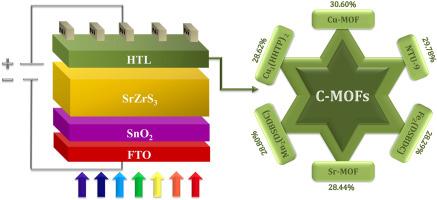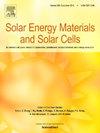Emerging class of SrZrS3 chalcogenide perovskite solar cells: Conductive MOFs as HTLs - A game changer?
IF 6.3
2区 材料科学
Q2 ENERGY & FUELS
引用次数: 0
Abstract
The emerging SrZrS3 chalcogenide perovskite has been suggested as a potential alternative to lead halide perovskites, offering unique optoelectronic properties while addressing concerns such as lead toxicity and instability. Our research explored its potential, demonstrating the use of conductive metal-organic frameworks (c-MOFs) Cu-MOF ({[Cu2(6-mercapto nicotinate)]·NH4}n), NTU-9, Fe2(DSBDC), Sr-MOF ({[Sr(ntca)(H2O)2]·H2O}n), Mn2(DSBDC), and Cu3(HHTP)2 as promising substitutes for traditional HTLs via SCAPS-1D. By systematically optimizing the absorber and HTL properties, maximum PCEs of 30.60 %, 29.78 %, 28.29 %, 28.44 %, 28.80 %, and 28.62 % were accomplished for solar cell devices based on the aforementioned MOFs, respectively. Comparative analysis of initial and optimized solar cells using energy band diagrams, Nyquist plots, and quantum efficiency revealed that optimized devices consistently raised quasi-Fermi levels, significantly enhanced conductivity, and boosted solar cell performance. Additionally, the high recombination resistance of 1.4 × 107 Ω cm2, improved spectral response of 35 % in the NIR region, and heightened built-in potential (∼0.99 V) resulted in the highest efficiency of 30.60 % for Cu-MOF solar cells. This research highlights the promising potential of novel SrZrS3 absorbers and the utilization of c-MOFs as HTLs in solar cells, positioning them as a game changer in the PV field.

新出现的 SrZrS3 卤化物包晶太阳能电池:作为 HTL 的导电 MOFs - 改变游戏规则?
新兴的 SrZrS3 卤化物包晶被认为是卤化铅包晶的潜在替代品,它具有独特的光电特性,同时还能解决铅毒性和不稳定性等问题。我们的研究探索了其潜力,通过 SCAPS-1D,证明了导电金属有机框架(c-MOFs)Cu-MOF({[Cu2(6-巯基烟酸)]-NH4}n)、NTU-9、Fe2(DSBDC)、Sr-MOF({[Sr(ntca)(H2O)2]-H2O}n)、Mn2(DSBDC)和 Cu3(HHTP)2 可作为传统 HTLs 的理想替代品。通过系统优化吸收剂和 HTL 特性,基于上述 MOFs 的太阳能电池装置的最大 PCE 分别达到 30.60%、29.78%、28.29%、28.44%、28.80% 和 28.62%。利用能带图、奈奎斯特图和量子效率对初始太阳能电池和优化太阳能电池进行的比较分析表明,优化器件不断提高准费米级,显著增强了导电性,提高了太阳能电池的性能。此外,Cu-MOF 太阳能电池的重组电阻高达 1.4 × 107 Ω cm2,在近红外区域的光谱响应提高了 35%,内置电位也有所提高(0.99 V),因此效率最高,达到 30.60%。这项研究凸显了新型 SrZrS3 吸收剂的巨大潜力,以及 c-MOFs 作为 HTLs 在太阳能电池中的应用,使其成为光伏领域的游戏规则改变者。
本文章由计算机程序翻译,如有差异,请以英文原文为准。
求助全文
约1分钟内获得全文
求助全文
来源期刊

Solar Energy Materials and Solar Cells
工程技术-材料科学:综合
CiteScore
12.60
自引率
11.60%
发文量
513
审稿时长
47 days
期刊介绍:
Solar Energy Materials & Solar Cells is intended as a vehicle for the dissemination of research results on materials science and technology related to photovoltaic, photothermal and photoelectrochemical solar energy conversion. Materials science is taken in the broadest possible sense and encompasses physics, chemistry, optics, materials fabrication and analysis for all types of materials.
 求助内容:
求助内容: 应助结果提醒方式:
应助结果提醒方式:


